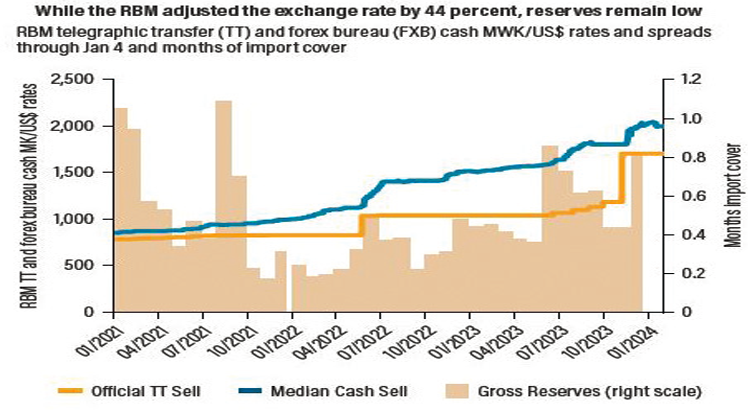Forex drought limits auctions
Financial Market Dealers Association of Malawi (Fimda) says commercial banks are not participating in the foreign exchange auctions as the market is still short of foreign currency.
In a written response on Friday, Fimda president Lesley Fatch said as a result, the amount mobilised from the auctions is not substantial.
The response by Fimda comes in the wake of published World Bank data which shows that between November 2023 and January 2024, the Reserve Bank of Malawi (RBM) only generated $700 000, less than one day import cover from forex auctions.
This is happening at a time when the spread between the official and median bureau rates has started to widen to over

17 percent as at January 2024, from the six percent that was attained following the November 2023 kwacha devaluation by 44 percent.
Fatch said that not withstanding, financial market dealers consider the adoption of the auction mechanism a positive development in the exchange rate
management as it gives the market the option for a responsive exchange, unlike the previous arrangement which was rigid.
He said: “We have seen the exchange rate moving on a few occasions basing on the auctions, which speaks to the objective of the central bank in adoption of a market determined exchange rate.
“As regards the amount of forex mobilised, we have to appreciate the fact that the market is short of foreign currency which leads to limited participation on the auctions by banks [where banks have to sell currency to RBM].
“As such, not all the banks participate on the auctions; hence, the amount mobilised from the auctions not being substantial so far as the same liquidity sold to RBM through auctions would otherwise be used to settle
client’s import bills by the banks.”
After the devaluation in November 2023, the spread between the official and median bureau rates initially narrowed to six percent, but has subsequently widened to over 17 percent in January 2024.
However, the kwacha has remained stable at K1 700 on the official bureau rates.
Ironically, the RBM had been conducting monthly forex auctions since January 2023, leading to a 14 percent depreciation of the local currency against the US dollar from June to October 2023.
More recently, the central bank announced plans to increase the frequency of foreign exchange auctions and permit intermediaries to trade at freely negotiated rates.
RBM spokesperson Mark Lungu could, however, not give details as to how much the central bank has raised since the forex auctions started, emphasising that the primary aim of foreign exchange auctions is not to raise foreign exchange, but to assist in determining the correct price in a transparent manner.
“In that case, we don’t really look at how much we have bought.”
“We should understand that despite the measures put in place, the country still faces a mismatch between supply and demand of foreign exchange and that puts pressure on the exchange rate,” he said.
Meanwhile, data shows that official foreign exchange reserves have only improved slightly in 2023, despite efforts to rebuild them.
As at December 2023, gross official reserves were recorded at $201.3 million (0.8 month of import cover), an increase from $120.2 million (0.5 months of import cover) at the end of 2022.





